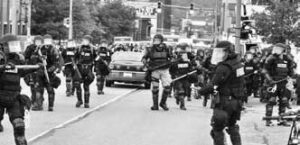
I have had the unfortunate privilege of experiencing two urban shutdowns in the U.S. In 2009, while living in a quickly gentrifying neighborhood adjacent to the University of Pittsburgh as a graduate student, I experienced a preemptive shutdown of a major city during the G-20 summit meeting of the finance ministers of the top world economies.
I witnessed the first domestic use of a Long Range Acoustic Device (or LRAD), the smell of tear gas wafting into my apartment, and the aftermath of my dumbfounded undergraduate students, ostensibly apolitical, recently gassed and rubber-bulleted, wonder how their adopted city and university officials could collude so callously at their expense.
Less than four years later, now living on the gentrifying border between Roxbury and Jamaica Plain in Boston as a post-doctorate student, I heard police and fire sirens topple out of the tight, winding streets of the Hub during and after the April 15 Boston Marathon bombing, received the email, text-message, television, and radio suggestions (orders?) to “shelter in place,” and during the aftermath listened to liberal public and conservative talk radio hosts out-do themselves in pride of how my recently adopted city had come together to get the bad guy and be, “Boston Strong.”
Outside of professional hockey and football news, Boston and Pittsburgh are not generally compared or contrasted, and they were not in the days following the marathon bombing this spring. Why would they?
During the G-20, Pittsburgh did not suffer a terrorist attack and during the marathon attack and ensuing search, Boston-area residents were not singled-out by law-enforcement because they marched in protests.
But as my experiences glanced off listening to the facts on the evening news about a locked-down city, a resonant chill continued to drift through my ears and eyes. Perhaps Pittsburgh and Boston, both now firmly on the gentrifying side of their 1990s urban renaissances, both invested deeply in meds and eds as well as security and neurotechnology, were not so different in their reactions and responses to policing a crisis.
The assemblage of forces, reactions, and repercussions that accompanied both events are striking. In both cases, major US cities were brought to a standstill, not by terrorists, but by the reaction of local officials, heavily armed police, and the stunned acquiescence and assent of local residents. In Pittsburgh, the shutdown was preemptive in expectation of the demonstration against the representatives of world finance. Many businesses, terrified by media and police hysteria began boarding up their operations for fear of mass unrest from protesters days before the G-20 events began.
In Boston, the shutdown came in the wake of the attack, carried out, again largely voluntarily, by a citywide manhunt by an occupation-sized force of police, and a public that, from all reports, believed in the justness of the search. Both media events happened during a time of increased surveillance and during a time when there has been more regular domestic use of military technologies brought home from our wars in the Middle East. Each occupation–it is hard to call them by any other name–demanded assent on the street during and at the polls after the periods of crisis.
During the Pittsburgh events, my reaction was to march in an unpermitted pre-G-20 march, then run from earsplitting noise emitted by the LRAD, speak out after the fact at a police review board hearing, and then screen, when appropriate, documentaries in my classroom in the following semesters. What struck me at the time, and what I focused on in my scholarly research after the events, was the domestic use of military weapons technology by the state to suppress dissent and the legitimacy such use gained among the population.
However, in the Boston aftermath, it is the acquiescence of residents that strikes me as the most important fact of both events. That Boston residents would so easily stay inside and give their city over to police without a declaration of martial law was deeply troubling. This was reminiscent of the willingness of Pittsburgh businesses to give into police propaganda and abandon their city during the G-20, and citizen failure to demand any serious consequences from city officials after the police rioted in the neighborhoods where many university students lived and studied. What resonates with me here in Boston four years later, is the seeming entrenched cynicism of twelve years of the global war on terror instead of a wider skepticism of the very wisdom of so-called “Homeland Security.”
There must be a caveat here: living for only a few days under vague threat from a police-force-on-steroids is not remotely as intense as the experience of living in Afghanistan or Iraq over the last decade or, for that matter, the experience of living day-in and day-out in many US neighborhoods where the difference between policing and military occupation seem arbitrary and unnervingly thin: the flashing close-captioned television cameras in West Baltimore, the regular use of curfews in Detroit to constrain youth during major events, or the constant police presence in neighborhoods like Homewood or the Hill in Pittsburgh or Roxbury and Dorchester in Boston.
Which is why on the Friday after the bombing, when I was supposed to be staying inside, I got in my car and drove to the Pit Stop Barbeque in Mattapan near Dorchester and ate a plate of ribs. Luckily, the hard-working owners of the delicious establishment had, like me, simply ignored the official memo.
